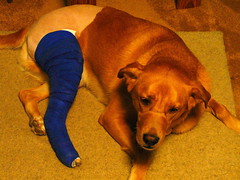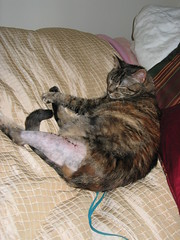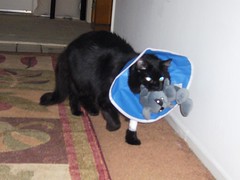My animal companion has to go under anesthesia – what can I do to help?
Tuesday, November 24th, 2009 If we are lucky our animal friends only have to go through surgery once, when they are spayed or neutered. However many animals do need to be under anethesia other times either for a dental cleaning, to get sutures, or to have surgery. Whatever the reason, surgery and anethesia are hard on our animal friends. But there are things you can do to help them recover faster and more comfortably.
If we are lucky our animal friends only have to go through surgery once, when they are spayed or neutered. However many animals do need to be under anethesia other times either for a dental cleaning, to get sutures, or to have surgery. Whatever the reason, surgery and anethesia are hard on our animal friends. But there are things you can do to help them recover faster and more comfortably.
As always, check with your veterinarian on any supplements you use.
Arnica is a homeopathic remedy which helps with bruising and trauma. Over the years I have been amazed and impressed at how much difference this very safe remedy can make in healing. I have seen incisions heal in half the time and dogs have very little bruising and swelling in situations you would normally expect to see it.
I always recommend Arnica for all my animal patients who have to undergo surgery or any other procedure that there will be tissue or bone trauma. Because it is a homeopathic remedy it is very safe ever for old and debilitated animals.
I use the Arnica 30c pellets and dose them at 2-3 pellets (usually 2 for cats/small dogs and 3 for dogs) the morning of surgery, the evening after surgery, and then three times a day for three days. Because the pellets are so small they can safely be given the morning of surgery.
Arnica can be bought at most health and supplement stores or by clicking on Arnica.
I highly recommend an acupuncture treatment right after surgery or anesthesia. Acupuncture can help with clearing anesthesia from an animal’s system and decrease the chance of them having a hard recovery. Acupuncture can also help ease pain and speed healing.
If possible acupuncture can be performed the day of surgery after an animal has woken up. Many times this is not possible because of the hours acupuncturists work and I end up treating most animals the day after surgery.
Acupuncture can also help dogs who have had bad recoveries to anesthesia in the past and and make it possible to perform dentals or surgeries on these sensitive animals.
While I don’t recommend Yunnan Baiyao (also called Yunnan Paiyao) for all animals undergoing surgery or anethesia, it is still one of my most important herbal formulas. I mainly use it in any procedure or surgery where there is a concern about bleeding. This includes many tumor removal and abdominal surgeries. I have seen this wonderful herbal formula save animal’s lives before.
Please see my article, A Magic Vial of Yunnan Baiyao and the wikipedia article.
I usually dose Yunnan Baiyao at one capsule twice a day for a few days before and after surgery for your average sized dog. Cats and small dogs, I use the powder and put about a 1/8 of a teaspoon in their food twice a day.
Yunnan Baiyao can be bought in most international districts and by clicking on Yunnan Baiyao above.
If one of my animals need to undergo surgery I always give them a reiki session before to get them into a good place for surgery. I usually work with a local practitioner, Rose DeDan, who also does animal communication. She is able to help explain what is going to happen and put their body in the best possible place for surgery and/or anesthesia.
Enough can not be said about pain medication. Make sure your veterinarian gives your animal pain medication before surgery and sends you home with something you can give at home. Nothing is worse then seeing our animals in pain and not being able to do anything about it. Routine dentals do not usually need pain meds.
You are the safest person to your animal. They want to be with you after surgery and they want to feel loved and cared for. If possible consider taking a day off work after their surgery or plan your animal’s surgery or procedure on a Friday.
It is so important to have somewhere safe, quiet, warm and soft to recover after surgery. Anesthesia can make the senses more sensitive and many animals get headaches coming out of surgery. Often times the drugs used also make our animal friends disoriented. Make sure that there is no access to stairs and nothing to fall off of. Keeping lights dim and sound to a minimum also helps. Sometimes classical music played softly will help relax our friends.
I hope these simple suggestions are helpful! I know they have helped many of the animals I work with and my own beloved animal companions.


